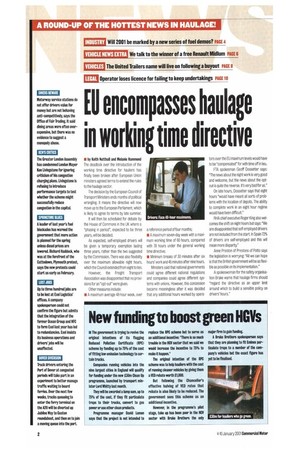EU encompasses haulage in working time directive
Page 4

If you've noticed an error in this article please click here to report it so we can fix it.
B by Keith Nulthal and Melanie Hammond The deadlock over the introduction of the working time directive for hauliers has finally been broken after European Union ministers agreed terms to extend the rules to the haulage sector.
The decision by the European Council of Transport Ministers ends months of political wrangling. it means the directive will now move up to the European Parliament, which is likely to agree its terms by late summer.
It will then be scheduled for debate by the House of Commons in the UK where a "phasing in period', expected to be three years, will be decided.
As expected, self-employed drivers will be given a temporary exemption lasting three years, rather than the two suggested by the Commission. There was also flexibility over the maximum allowable night hours, which the Council extended from eight to ten.
However, the Freight Transport Association was disappointed that no provisions for an "opt-our were given.
Other measures include: • A maximum average 48-hour week, over
a reference period of four months; IR A maximum seven-day week with a maximum working time of 60 hours, compared with 78 hours under the general working time directive;
• Minimum breaks of 30 minutes after six hours' work and 45 minutes after nine hours.
Ministers said that national governments could agree different national regulations and companies could agree different systems with unions. However, this concession became meaningless after it was decided that any additional hours worked by opera
tors over the EU maximum levels would have to be "compensated" for with time off in lieu.
FTA spokesman Geoff Dossetter says: "The news about the night work is very good and welcome, but the news about the optout is quite the reverse. It's very bad for us."
On late hours, Dossetter says that eight hours "would have meant all sorts of problems with the location of depots. The ability to complete work in an eight hour regime would have been difficult."
RHA chief executive Roger King also welcomes the shift on night hours but says: "We are disappointed that self-employed drivers are not included from the start. In Spain 72% of drivers are self-employed and this will mean more disparity."
Anne Preston of Prestons of Potto says the legislation is worrying: "All we can hope is that the British government will be as flexible as possible on its implementation."
A spokeswoman for the safety organisation Brake warns that haulage firms should "regard the directive as an upper limit around which to build a sensible policy on drivers' hours."




























































































